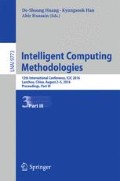Abstract
Most quantitative trait loci (QTL) mapping experiments typically collect phenotypic data on single traits. However, Research complex correlated traits may provide more available information. We develop a novel algorithm for multiple traits quantitative trait loci mapping by using Bayesian Variable Selection Regression, or BVSR, that allows a new robust genetic models for different and correlated traits. We develop computationally efficient Markov chain Monte Carlo (MCMC) algorithms for performing joint analysis. Taken together, these factors put a premium on having interpretable measures of confidence for individual covariates being included in the model. We conduct extensive simulation studies to assess the performance of the proposed methods and to compare with the conventional single-trait model and existing multiple-trait model. More generally, we demonstrate that, despite the apparent computational challenges, our proposed new algorithm can provide useful inferences in quantitative trait loci mapping.
Access this chapter
Tax calculation will be finalised at checkout
Purchases are for personal use only
References
Li, Y., Zhang, M., Zhao, M.: eQTL, Quantitative Trait Loci (QTL). Springer 265–279 (2012)
Mah, J.T., Chia, K.S.: A gentle introduction to SNP analysis: resources and tools. J. Bioinf. Comput. Biol. 5(5), 1123–1138 (2007)
Cookson, W., Liang, L., Abecasis, G., Moffatt, M., Lathrop, M.: Mapping complex disease traits with global gene expression. Nat. Rev. Genet. 10(3), 184–194 (2009)
Smith, L., Kruglyak, M.: Gene-environment interaction in yeast gene expression. PLoSBiol 6(4), e83 (2008)
Brem, B., Kruglyak, L.: The landscape of genetic complexity across 5,700 gene expression traits in yeast. Proc. Natl. Acad. Sci. U.S.A. 102(5), 1572–1577 (2005)
Gao, C., Tignor, N.L., Strulovici-Barel, Y., Hackett, N.R., Crystal, R.G.: HEFT: eQTL analysis of many thousands of expressed genes while simultaneously controlling for hidden factors. Bioinformatics 30(3), 369–376 (2014)
Higo, K., Ugawa, M., Iwamoto, Y., Korenaga, T.: Plant CIS-acting regulatory DNA elements (PLACE) database. Nucleic Acids Res. 27(1), 297–300 (1999)
Mahr, S., Burmester, G.R., Hilke, D., Göbel, U., Grützkau, A., Häupl, T., Hauschild, M., Koczan, D., Krenn, V., Neidel, J.: CIS-and trans-acting gene regulation is associated with osteoarthritis. Am. J. Hum. Genet. 78(5), 793–803 (2006)
Cheng, W., Shi, Y., Zhang, X., Wang, W.: Fast and robust group-wise eQTL mapping using sparse graphical models. BMC Bioinformatics 16, 2 (2015)
Huang, D.S., Yu, H.J.: Normalized feature vectors: a novel alignment-free sequence comparison method based on the numbers of adjacent amino acids. IEEE/ACM Trans. Comput. Biol. Bioinf. 10(2), 457–467 (2013)
Zheng, C.H., Zhang, L., Ng, V.T.-Y., Shiu, C.K., Huang, D.S.: Molecular pattern discovery based on penalized matrix decomposition. IEEE/ACM Trans. Comput. Biol. Bioinf. 8(6), 1592–1603 (2011)
Zheng, C.H., Huang, D.S., Zhang, L., Kong, K.Z.: Tumor clustering using non-negative matrix factorization with gene selection. IEEE Trans. Inf Technol. Biomed. 13(4), 599–607 (2009)
Deng, S.P., Zhu, L., Huang, D.S.: Predicting hub genes associated with cervical cancer through gene co-expression networks. IEEE/ACM Trans. Comput. Biol. Bioinf. 13(1), 27–35 (2016)
Zhu, L., Guo, W.L., Deng, S.P., Huang, D.S.: ChIP-PIT: Enhancing the analysis of ChIP-Seq data using convex-relaxed pair-wise interaction tensor decomposition. IEEE/ACM Trans. Comput. Biol. Bioinf. 13(1), 55–63 (2016)
Zhu, L., Deng, S.P., Huang, D.S.: Two-stage geometric method for pruning unreliable links in protein-protein networks. IEEE Trans. Nano Biosci. 14(5), 528–534 (2015)
Deng, S.P., Zhu, L., Huang, D.S.: Mining the bladder cancer-associated genes by an integrated strategy for the construction and analysis of differential co-expression networks. BMC Genom. 16 (2015)
Deng, S.P., Huang, D.S.: SFAPS: an R package for structure/function analysis of protein sequences based on informational spectrum method. Methods 69(3), 207–212 (2014)
Huang, D.S., Zhang, L., Han, K., Deng, S.P., Yang, K., Zhang, H.B.: Prediction of protein-protein interactions based on protein-protein correlation using least squares regression. Curr. Protein Pept. Sci. 15(6), 553–560 (2014)
Zhu, L., You, Z.H., Huang, D.S., Wang, B.: t-LSE: a novel robust geometric approach for modeling protein-protein interaction networks. PLoS ONE 8(4), e58368 (2013)
Acknowledgements
This work was supported by the grants of the National Science Foundation of China, Nos. 61133010, 61520106006, 31571364, 61532008, 61572364, 61373105, 61303111, 61411140249, 61402334, 61472282, 61472280, 61472173, 61572447, and 61373098, China Postdoctoral Science Foundation Grant, Nos. 2014M561513 and 2015M580352.
Author information
Authors and Affiliations
Corresponding author
Editor information
Editors and Affiliations
Rights and permissions
Copyright information
© 2016 Springer International Publishing Switzerland
About this paper
Cite this paper
Yuan, L., Han, K., Huang, DS. (2016). Novel Algorithm for Multiple Quantitative Trait Loci Mapping by Using Bayesian Variable Selection Regression. In: Huang, DS., Han, K., Hussain, A. (eds) Intelligent Computing Methodologies. ICIC 2016. Lecture Notes in Computer Science(), vol 9773. Springer, Cham. https://doi.org/10.1007/978-3-319-42297-8_80
Download citation
DOI: https://doi.org/10.1007/978-3-319-42297-8_80
Published:
Publisher Name: Springer, Cham
Print ISBN: 978-3-319-42296-1
Online ISBN: 978-3-319-42297-8
eBook Packages: Computer ScienceComputer Science (R0)

